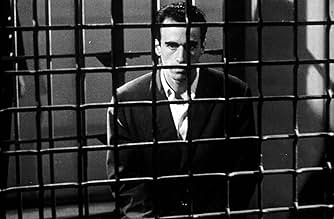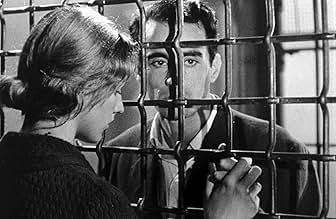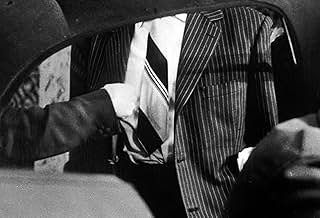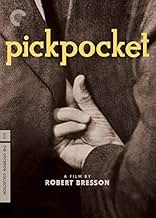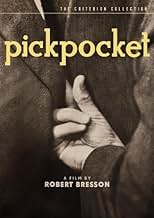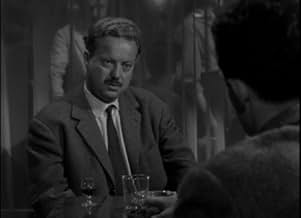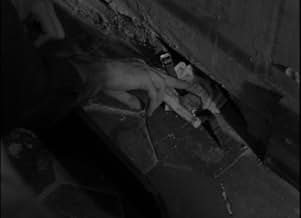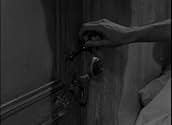AVALIAÇÃO DA IMDb
7,6/10
27 mil
SUA AVALIAÇÃO
Michel é libertado da prisão após cumprir uma pena por roubo. Sua mãe morreu, portanto, ele recorre aos furtos como meio de sobrevivência.Michel é libertado da prisão após cumprir uma pena por roubo. Sua mãe morreu, portanto, ele recorre aos furtos como meio de sobrevivência.Michel é libertado da prisão após cumprir uma pena por roubo. Sua mãe morreu, portanto, ele recorre aos furtos como meio de sobrevivência.
- Prêmios
- 3 indicações no total
Avaliações em destaque
A remarkable film even though the ending is anti-climactic. An amateur pickpocket gets lucky and meets Kassagi, the real-life pickpocket who served as the film's technical consultant. The most amazing scene is the one where three pickpockets rob one passenger after another on a train, taking wallets, passing them off to each other, then emptying and dumping them (or in one case, neatly replacing the lightened wallet in a man's pocket!). The light-finger techniques seem more or less authentic, although I imagine the director's script might have called for inauthentic bits of business. (No, I am not a pickpocket; I was a mark once, and they really messed up my life for a couple of days, but I have been fascinated ever since.)
The pickpockets in this movie follow the European style of stealing men's wallets practically face-to-face. (American pickpockets traditionally prefer to steal from behind to avoid any chance of a mark seeing their faces. When I was taken, I never saw, heard or felt anything.)
LaSalle as Michel is deadpan, but that seems to be part of his character. Now and again, he bubbles a little with suppressed feeling, mostly anger. His passion for Jeanne (Marika Green) is so completely submerged that it does not come out until the end. (If you think I'm spoiling anything, you will want to skip the on screen legend that opens the film because it gives away even more.) As a love story, this does not work. I get it, though: Something happened before the film begins that makes Michel extremely ashamed. He can't be with his mother or anyone he cares about because of his guilt.
The pickpockets in this movie follow the European style of stealing men's wallets practically face-to-face. (American pickpockets traditionally prefer to steal from behind to avoid any chance of a mark seeing their faces. When I was taken, I never saw, heard or felt anything.)
LaSalle as Michel is deadpan, but that seems to be part of his character. Now and again, he bubbles a little with suppressed feeling, mostly anger. His passion for Jeanne (Marika Green) is so completely submerged that it does not come out until the end. (If you think I'm spoiling anything, you will want to skip the on screen legend that opens the film because it gives away even more.) As a love story, this does not work. I get it, though: Something happened before the film begins that makes Michel extremely ashamed. He can't be with his mother or anyone he cares about because of his guilt.
This slow burn film from Robert Bresson is not going to be to everyone's taste, and I'm not sure it was to mine. It's a film I admired more than enjoyed.
It tells the story of a man who's addicted to theft, or maybe more accurately addicted to the rush of getting away with theft, or maybe more accurately addicted to the rush of possibly being caught thieving. It's not a long movie but it may try your patience, as it's very slow and very quiet. The main character is a bit of a blank slate, and he remains so. We never learn much about him, and I personally didn't feel especially invested in what happened to him. It was only in reading about the film after seeing it that I found out the ending is considered to be remarkable among film scholars, but I didn't react to it much myself.
The best scenes in the movie are those that show the elaborate rituals that exist among pickpocket teams, and the pretty amazing feats they pull off. They're like magicians who use sleight of hand for nefarious purposes.
Grade: B+
It tells the story of a man who's addicted to theft, or maybe more accurately addicted to the rush of getting away with theft, or maybe more accurately addicted to the rush of possibly being caught thieving. It's not a long movie but it may try your patience, as it's very slow and very quiet. The main character is a bit of a blank slate, and he remains so. We never learn much about him, and I personally didn't feel especially invested in what happened to him. It was only in reading about the film after seeing it that I found out the ending is considered to be remarkable among film scholars, but I didn't react to it much myself.
The best scenes in the movie are those that show the elaborate rituals that exist among pickpocket teams, and the pretty amazing feats they pull off. They're like magicians who use sleight of hand for nefarious purposes.
Grade: B+
To my previous comments, I should like to add/correct. When I said that Kassagi, who plays "first accomplice" (1er complice), was a 'real-life pickpocket who served as the film's technical consultant' I was not only inaccurate, but the fact that Kassagi was actually a stage magician has some bearing on the film itself, for although the scene in which the pickpockets rip off a series of train passengers is authentic in that it shows how pickpockets operate in terms of teamwork and speed, nevertheless, the moment when Kassagi (?) 'neatly replac[es] the lightened wallet [back] in a man's pocket' is not something a real pickpocket would likely do; it is, however, exactly what a stage magician would do. A real pickpocket has no audience (or so he hopes) whereas a magician wants the audience to see him make a monkey of the hapless "volunteer from the audience." In this case, Kassagi's idea (as I am sure it was) provides a brief moment of comic relief in the middle of a movie that is otherwise without a lot of humor. It is a welcome touch and Bresson was wise to keep it in. Now, I also engaged in a fallacy when I said that 'American pickpockets traditionally prefer to steal from behind to avoid any chance of a mark seeing their faces.' In reality, American pickpockets take from behind because of necessity: even by 1959 when 'Pickpocket" was released, American men more and more carried their wallets in the hip pocket whereas European men, as can be seen in this film, continued to use the inside breast pocket. While the business about seeing the mark's face is part of the lore of American petty criminals, it is not the cause of the American style of picking pockets, but rather a rationalization after the fact.
In Paris, the lonely and anguished pickpocket Michel (Martin La Salle) lives in a dirty little room and spends his time stealing wallets and purses in public spaces. His only friends are Jacques (Pierre Leymarie), who tries to help him to find a job, and his mother's next door neighbor Jeanne (Marika Green). After the death of his mother, Michel teams-up with two smalltime thieves despite the permanent surveillance of the local police inspector (Jean Pélégri). Later he travels overseas to get rid of the observation of the police, but two years later he returns to Paris and finds Jeanne alone, with her son with Jacques after a brief love affair. Michel decides to help her and find an honest job; but in a horse race, he is tempted by his addiction with tragic consequences.
This is the first time that I have watched"Pickpocket" and I expected much more from this famous movie. The development of the lead character Michel is confused and it is clear that he is a troubled, lonely and anguished unemployed young man, but it is never clear the motives why he is addicted in stealing since he shows no ambition or dream or love. The beauty of Marika Green is impressive and she seems to love Michel since the very beginning but again her feelings are never clear. Indeed the actors and actress express no sentiments and the plot is very weird. My vote is seven.
Title (Brazil): "Pickpocket"
This is the first time that I have watched"Pickpocket" and I expected much more from this famous movie. The development of the lead character Michel is confused and it is clear that he is a troubled, lonely and anguished unemployed young man, but it is never clear the motives why he is addicted in stealing since he shows no ambition or dream or love. The beauty of Marika Green is impressive and she seems to love Michel since the very beginning but again her feelings are never clear. Indeed the actors and actress express no sentiments and the plot is very weird. My vote is seven.
Title (Brazil): "Pickpocket"
Robert Bresson's Pickpocket has many great moments, even as it didn't quite do it for me on a first viewing as a 'masterpiece'(some have said to see it twice, perhaps I will). Bresson's use of the camera is often intoxicating in the most subdued, subtle, in-direct distinctions; at times it does take on the prowess of literature. But my only minor nitpick with the film is that it leaves a sort of cold viewing on a viewer, with such simplicity and emotions stripped from the character(s) that it's hard to connect. And yet, this is really made up tenfold with the sort of style that can be likely called Bressonian; straightforward angles, tense medium close-ups, serene editing, and little to no music.
Whatever it sets up for this actor to do, it sets up well. Indeed, the actor who plays the protagonist here is actually very good, aside from the disconnection, and provides an excellent way for us to get along his side. He is a decent person, but there are certain things that get to him, which is why he feels he must steal. At times I almost had a grin as he made some successful grabs, by himself or his cohorts. Was I rooting for him, or just pleased by the pay-off of Bresson's suspense? Maybe both; there is definitely one truly virtuoso sequence in the film, when the pickpockets go on the train.
Like A Man Escaped, there is that sort of dissection, quietly and without really digging too deep, into what a man wants with his life, or doesn't want. While the hero has only one determination in Man Escaped, to get out, Pickpocket has a man who doesn't know what to do with himself, only coming to a genuine catharsis behind bars. I think I like Pickpocket a little more, but I may like it even more on another viewing.
Whatever it sets up for this actor to do, it sets up well. Indeed, the actor who plays the protagonist here is actually very good, aside from the disconnection, and provides an excellent way for us to get along his side. He is a decent person, but there are certain things that get to him, which is why he feels he must steal. At times I almost had a grin as he made some successful grabs, by himself or his cohorts. Was I rooting for him, or just pleased by the pay-off of Bresson's suspense? Maybe both; there is definitely one truly virtuoso sequence in the film, when the pickpockets go on the train.
Like A Man Escaped, there is that sort of dissection, quietly and without really digging too deep, into what a man wants with his life, or doesn't want. While the hero has only one determination in Man Escaped, to get out, Pickpocket has a man who doesn't know what to do with himself, only coming to a genuine catharsis behind bars. I think I like Pickpocket a little more, but I may like it even more on another viewing.
Você sabia?
- CuriosidadesBanned in Finland until 1965 because of its depiction of authentic pickpocketing techniques.
- ConexõesEdited into Histoire(s) du cinéma: Une histoire seule (1989)
- Trilhas sonorasSuite de symphonies d'Amadis (selection)
(uncredited)
Music by Jean-Baptiste Lully (as J.B. Lulli)
Éditions Transatlantiques
Principais escolhas
Faça login para avaliar e ver a lista de recomendações personalizadas
- How long is Pickpocket?Fornecido pela Alexa
Detalhes
Bilheteria
- Faturamento bruto mundial
- US$ 7.541
- Tempo de duração1 hora 16 minutos
- Cor
- Proporção
- 1.37 : 1
Contribua para esta página
Sugerir uma alteração ou adicionar conteúdo ausente

Principal brecha
By what name was O Batedor de Carteiras (1959) officially released in India in English?
Responda

